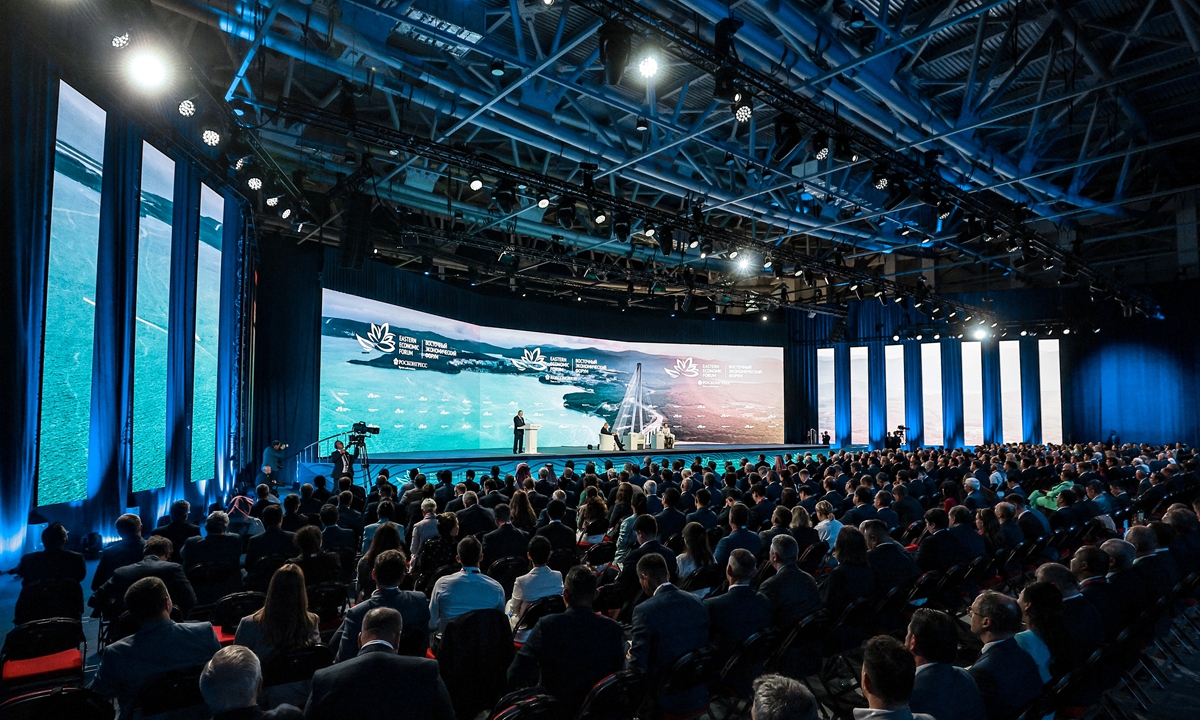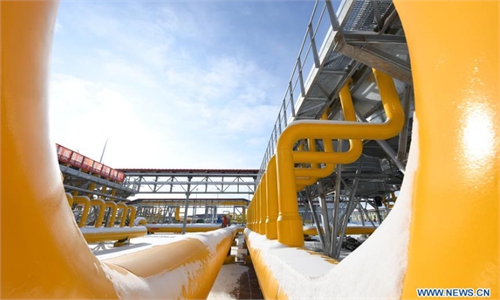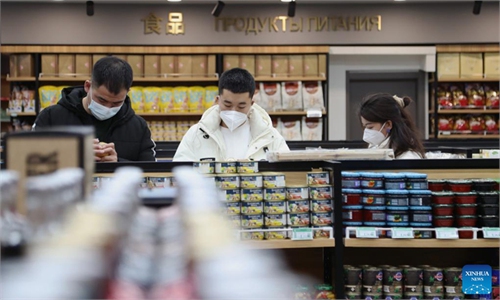Development of the Far East an absolute priority for Russia: Putin at EEF
Speech tells world Moscow is also 'turning to the East, South economically'

Russian President Vladimir Putin delivers a speech during a plenary session of the Eastern Economic Forum (EEF) 2023 at the Far Eastern Federal University on Russky Island in Vladivostok, Russia, on September 12, 2023. Photo: IC
Russian President Vladimir Putin met with Chinese Vice Premier Zhang Guoqing Tuesday on the sidelines of the 8th Eastern Economic Forum (EEF) in Vladivostok, Russia, in which Russian president said that with the joint efforts of both Russia and China, the bilateral relationship has entered its best period in history, with smooth development in various fields such as trade and economy, the Xinhua News Agency reported. The development of the Far East has become a new growth point for Russia-China cooperation, said the Russian president.
Some Chinese experts said that by boosting economic cooperation with major developing countries, Moscow is now trying to prove that Russia can develop without the West.
Zhang said that China is willing to work with Russia to implement the important consensus reached by the top leaders of the two countries, share development opportunities, deepen mutually beneficial cooperation and strengthen strategic coordination on regional development.
China-Russia trade could top $200 billion in 2023 for the first time, Putin said at the EEF, noting that bilateral trade had grown by around 30 percent on annual basis during recent years.
In 2019, China and Russia jointly set the goal of their bilateral trade reaching $200 billion by 2024.
The Chinese vice premier said bilateral trade reached $155.1 billion in the first eight months of 2023, up 32 percent from a year earlier. "We have every reason to believe that the goal, which was set at the highest level, to bring bilateral trade to $200 billion will be achieved ahead of schedule this year," the vice premier said, TASS reported.
At a routine press conference on Tuesday, Mao Ning, a spokesperson of the Chinese Foreign Ministry, said in response to a question about a "meeting between China and Russia's top leader by the end of this year" that Chinese President Xi Jinping and President Putin have all along maintained strategic communication in various ways and held in-depth exchanges of views on China-Russia cooperation and issues of mutual interest.
The two presidents will continue their close exchanges and guide our two countries' comprehensive strategic partnership of coordination for a new era to new heights, Mao said.
Development without West
Apart from China, many developing countries sent their top-level delegations to the economic forum from September 10-13. According to Russian media Sputnik, "The international agenda will include business dialogues with representatives of India, China, Laos, Mongolia, ASEAN, and the EAEU-BRICS meeting," Anton Kobyakov, the executive secretary of the forum's organizing committee stated.
Zhang Hong, an associate research fellow at the Institute of Russian, Eastern European and Central Asian Studies of the Chinese Academy of Social Sciences, told the Global Times on Tuesday that by inviting non-Western major economies like China, India and ASEAN, Moscow is trying to tell the world that after the West decoupled with Russia since the Ukraine crisis started, "Russia is not only turning to the East and the South politically and diplomatically, but also economically."
Putin said at the EEF that Western countries are ruining the system of trade and financial ties they worked to build, according to TASS. Putin said that is how "a new model of relations and integration is being born, but not according to Western models for the chosen 'golden billion' [a theory that Western elites are trying to amass wealth for the world's richest billion people at the expense of the rest of humanity], but for the whole of humanity, for the entire functioning and developing multi-polar world."
The Russian president said he is convinced that this model helps the creative energy of openness and a focus on concrete results to become a powerful competitive advantage of the Asia-Pacific region and a key factor that will define the global leadership of the region in terms of economic growth for a long time.
"Last year, Russia's trade with countries of the Asia-Pacific region increased by 13.7 percent, and grew by another 18.3 percent over the first half of this year," Putin said at the forum, Sputnik reported.
According to a preliminary estimate, Russian GDP growth was 4.9 percent year-on-year in the second quarter of 2023, the Federal State Statistics Service reported. The national statistical service earlier revised the estimate of GDP decline from 1.9 percent to 1.8 percent in annual terms for the first quarter of 2023, TASS reported in August.
Chinese analysts said Putin is telling the world that Russia can develop without the West, and by releasing this data, Russia is once again showing its determination to withstand Western sanctions and ensure economic growth, and afford the military conflict in Ukraine at the same time.
Zhang said "Russia and the West have decided to decouple with each other in the long term, and this is a great opportunity for Chinese firms."
Cui Heng, an assistant research fellow at the Center for Russian Studies at East China Normal University, agreed that when Russia and the West decouple with each other, China is becoming the biggest and most irreplaceable trade partner of Russia, and especially when Russia is reforming its industrial chain, Chinese firms have filled the gaps left by Western companies.
The improvement of China-Russia trade ties is not just in terms of volume, but more importantly, is making the two countries' industries more intertwined, Cui noted.
Northeast China and Russia's Far East
Putin said at a meeting with session moderators at the EEF that "We will definitely not be scaling down the pace of development in the region, because the development of the Far East is an absolute priority for Russia, a direct priority for Russia as a whole for the entire 21st century, because it is a colossal region with a small population but huge potential," TASS reported on Tuesday.
Putin pointed out that it is necessary "not only to hold on to this region, but also to develop it and put its resources to work for the benefit of the state." According to the president, "it is necessary to talk not only about the development of mineral resources; here [in the Far East] it is necessary to build even more enterprises for the processing of industrial raw materials, so as to increase the added value."
"We will be working on this; we will strengthen aircraft construction [and] shipbuilding; we will engage in developing industrial production across the most diverse range of sectors," the Russian president said.
Zhang Hong said that "this is a key signal that should be noticed, because in the past, Russia had many ideas to develop its Far East, including high-tech innovation, international trade and agriculture. But now, Russia is being more specific."
Due to the limits of manpower resources and technologies, added to the sanctions imposed by the West, Moscow has now realized that the development of mineral resources is more practical and feasible for the region, and this will also guide cooperation between China's northeast region and Russia's Far East in the future, experts said.
According to Xinhua on Saturday, Chinese President Xi Jinping stressed "writing a new chapter" in striving for the full revitalization of Northeast China as he convened a key meeting in Heilongjiang Province on Thursday.
Xi stressed advancing opening up and cooperation internally and externally, and called on the northeastern region to integrate closely into Belt and Road cooperation and play a bigger role in facilitating domestic economic flows and linking domestic circulation and international circulation.



